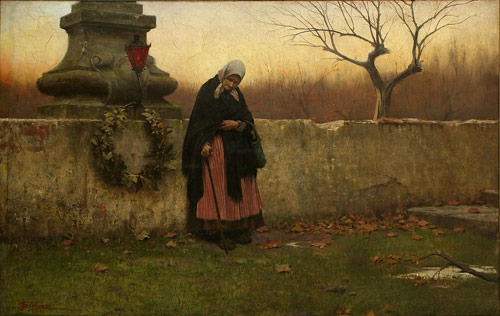In Latin America – “Día de los Muertos” (Spanish – Day of the Dead).
Celtic nations firmly believed that at certain times of the year the boundaries between the mortal and unearthly realms briefly thinned or broke down. It was further accepted, as being true, that this veil between the two worlds was at it’s thinnest at this time of year; on Halloween (Samhain), All Saints’ Day, and All Souls’ Day.

All Souls’ Day is a day to honour and pray for the dead, especially those who are believed to be in purgatory. It is believed that Saint Odilo, Benedictine Abbot of Cluny, France, (son of Berald de Mercoeur and Gerberga) first designated a specific day for remembering and praying for those in the process of purification or temporary punishment in which, according to medieval Christian and Roman Catholic belief, the souls of those who die, in a state of grace, are made ready for acceptance into heaven.
On All Souls’ Day, those who have left us can come back for a brief visit on this night. As they pass through your home, they leave their love and blessings, and take away your troubles. Your personal energy and love for them is the path which attracts them back amongst the living.
Ancient Irish people believed that the souls of the dead would return to their family home. The dead were believed to be repositories of wisdom and lore and that during this blessed period they would return to speak to their descendants here on earth.
Great care was taken, therefore, on All Souls’ Night to ensure they felt welcome. Returning ancestors, it was believed, would bestow two main gifts; (1) the ability to remember old days and traditions and (2) the ability to hold a deeper understanding of how we are forever linked to our bloodline.
To this end, earlier in the day graves would be visited and cleaned, with a candle left to burn. At home, to prepare for the arrival of the dead, Irish families would light a warm fire, sweep the floor, put a place setting of available cutlery on the kitchen table for each current generation deceased relative. A bowl of spring water and a container of salt was also present, latter representing the meal you would have prepared for them, when they were on this side.
With the door to the house left unlocked for the night, a candle, for each of those who had passed over, was lit and placed in the window that faced in the direction of the cemetery. When evening prayers were said before bed, these candles would be extinguished, with possibly one allowed to burn out.
Many of these traditions have now died out in Ireland, but today on our island, All Souls’ Day still remains a day of commemoration when prayers and Masses are said for those dearly beloved who have passed on.

In 1950s North Cork countryside, All Souls Night was the night before All Saints Day.
As a child I assumed that meant something like ‘The cavalry are coming’ – get through the scary part and the holy ones will save us. No idea where I got that idea!
Halloween games were seen as a fun part of the superstitions to protect ourselves.
We never heard of Samhain except as ancient history.
November 2nd was an ordinary day.
Family graves were visited on Christmas Eve.
Different eras/areas, different strokes!
I leave a candle in the window in England but nowadays it is a battery powered one.